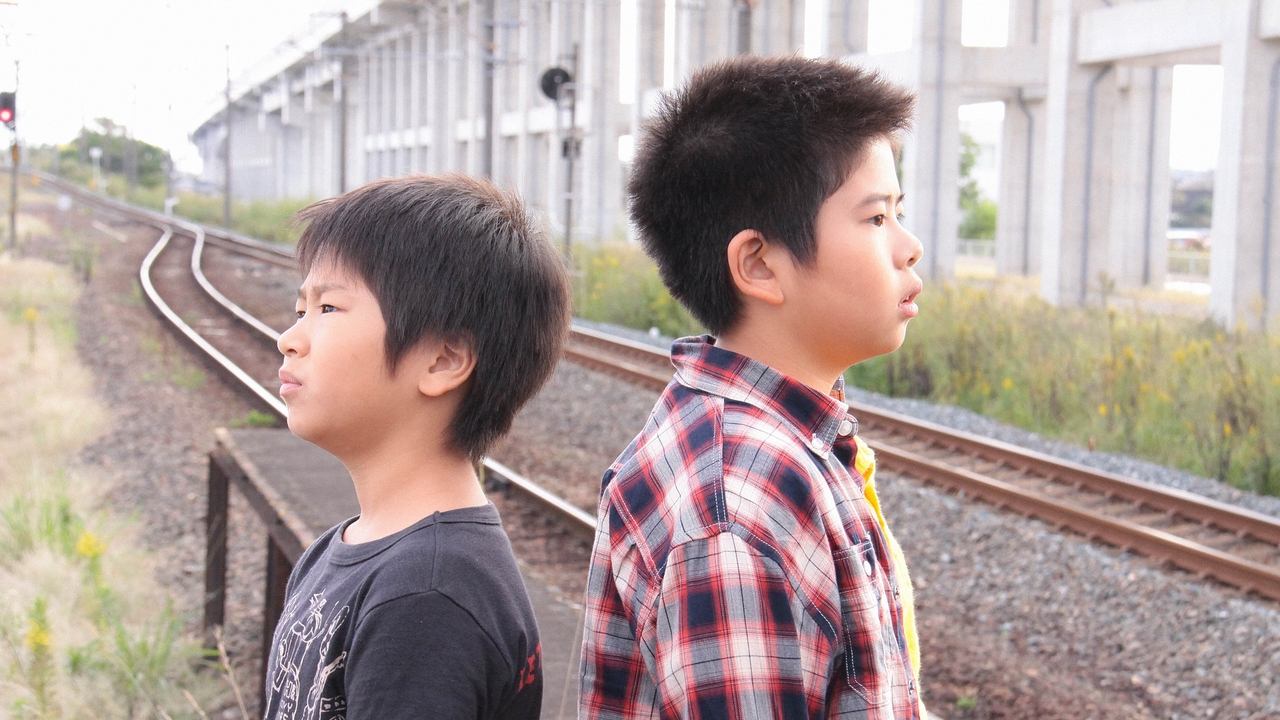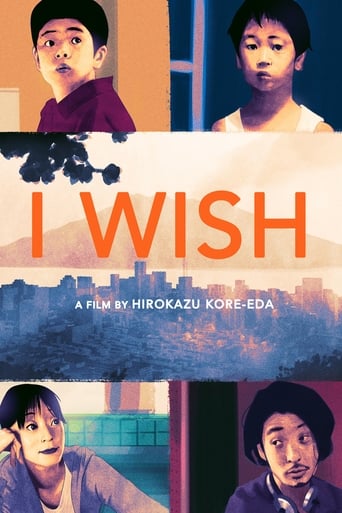

What a beautiful movie!
... View MoreSuch a frustrating disappointment
... View MoreJust perfect...
... View MoreFrom my favorite movies..
... View MoreTwo young brothers, Kouichi and Ryuunosuke live apart in Fukuoka and Kagosima because of there parent's divorce. One day they know about a rumour that the person who sees the two new bullet trains passing each other for the first time gains his dream, and they plans to see it to make their wish to live together with their family again. With few friends of them, they goes to their meeting point. This film is very nice. We can see two brother's strong wish and their grow up in their spirits through the trip clearly. However, if I could say one thing, I want to see more about their past, or their life with their parent after they live apart. I could see their desire to live with their family again, but I could not see much trouble or conflict. However other than this, I think this film is very good and moving film.
... View MoreKoichi (the fat one) and Ryunosuke (the 'on acid' one) are two brothers separated along with their parents: Koichi now living with his mother and grandparents in Kagoshima and Ryunosuke in Fukuoka with his father. Once a happy family living in Osaka, they are now divided, with Koichi in a sleepy town in southern Kyushu overlooked by a rumbling volcano; and Ryunosuke with his musician father in modern and vibrant Fukuoka to the island's north. Wanting his family back together again, like Janet Jackson, Koichi comes up with an idea to make it happen.Each with a group of friends, the brothers makes the trip to Kumamoto: the point they calculate where the new Sakura Shinkansen will meet in opposing directions. When this happens, miracles will follow.Of course, this idea is childish – that's why this is a film about children. Kore-eda Hirokazu's latest feature seems to combine two of his previous releases, 'Nobody Knows' and the Ozu-like 'Still Walking', looking at the break-up of family through the eyes of a child. Using real-life brothers (well, their family name is the same, anyway) for the leads, Hirokazu again captures the imagination with a film that furthers his place among the greats of Japanese cinema.Like many of his other films, 'I Wish' is simple, but effective in his tackling of subjects in modern society, like an Ozu for a new generation, with the dreams and motivations of all cast members considered.politic1983.blogspot.com
... View MoreIf, as many have pointed out, Koreeda is Ozu's cinematic heir, then I Wish is Koreeda's take on Ozu's Good Morning. Both films focus on adorable young kids and Japanese family life, and I have no qualms about saying between the two films, Koreeda easily outdoes Ozu. Not only is Koreeda's depiction of children subtler and more intuitive (no fart jokes here), but he coaxes wonderfully naturalistic performances from his child actors. Is there a director alive who does better work with kids than Koreeda? The movie really takes flight once the kids hit the road on their quest, and I loved the Ozu-ish part where they meet an elderly couple that takes in all the children for a night. Just a wonderful movie with tons of heart. Puts the human in humanistic filmmaking.
... View More8.5 average user ratings on 37 votes? I Wish people would stop voting based on director's prestige. "I Wish" is a bland mainstream movie that would've been unnoticed without the marketing power of Koreeda Hirokazu and its A-list actors as the supporting cast."I Wish", Japanese title "Kiseki (Miracle)", is sort of a road movie about a bunch of kids going to see the new Kyuushuu Bullet Trains crossing. Majority of the film follows the lives of the two brothers: One in Kagoshima; the other in Fukuoka. They reunite after their parents broke up 6 months ago. One day, the older brother Kouki hears the urban legend that witnesses of the new bullet trains crossing will have their wishes granted, much like seeing shooting stars. The brothers and their friends begin collecting money for the trip to have their wishes granted.I did like how the bullet trains connecting to the Southwestern Japan marks a new era in the region. Perhaps that is the reason kids, the next generation, were the main focus of the story. It was also interesting that Tower of the Sun, the symbol of Osaka Expo '70, was torn down in Kouki's dream to further signify coming of a new era.However, over three-quarters of the film was about getting ready for the trip, and the ending seemed very rushed despite the movie spending so much time with the plot getting nowhere. While "process is more important than result" is a common theme in Japanese films and certainly present in this film, the actual process (the trip to the destination) was cut too short as a series of convenient events, and the preparation stage was simply introduction of each kids and their problems in the most obvious ways imaginable. Furthermore, "I Wish" completely fails to build up for the climax (didn't have a climax?), making it an extremely bland movie... and this is NOT because it's one of those subtlety Japanese film in any way. "Koko ni Irukoto" (2001) is a subtle film, "Tennen Kokekko" (2007) is a subtle film, yet both of them (and many other Japanese films of its type) managed to be far more heartwarming than this generic road movie.The leading actors, dubbed "MaedaMaeda" by the marketing team for being real brothers with the last name "Maeda" (also happens to be homophone with "forward" in Japanese), delivered very underwhelming performances. In fact, none of the child actors' acting can be truly called "acting". While this kind of performance works for the documentary style of Koreeda, it is a total disaster for a movie with such tightly written script, also making it feel extremely uneven with the supporting adult actors."I Wish" has THE biggest waste of acting talent I have ever seen. Odagiri Joe had about 10-minute screen time. Abe Hiroshi, Nagasawa Masami, and Natsukawa Yui... all of whom capable of leading in their own films, in addition to many veteran supporting actors, were reduced to cameo-like 3-minute appearances in this movie. Nagasawa Masami in particular was not even recognizable. With exception of Ootsuka Nene, none of the cast had to be the big-names since they had nothing to work with. They were there solely for marketing purposes.Unlike Miike Takashi who also sold out to the mainstream in last year's TIFF participant "13 Assassins" (2010), Koreeda Hirokazu failed to create something extraordinary for the general audience and failed to draw out the best out of his talented cast. This film had nothing that hundreds of other Japanese directors couldn't have made."I Wish" is an average quality Japanese film made to glorify the new Kyuushuu Bullet Train and PR for the local businesses. Like in the movie, miracle didn't happen here.
... View More